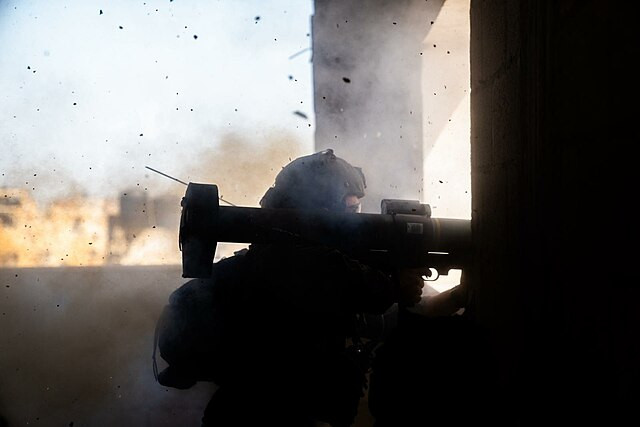An Israeli airstrike in southern Lebanon on Saturday resulted in the deaths of at least ten people, marking one of the deadliest incidents since the conflict between Israel and Hamas reignited on October 7. The strike, which targeted a suspected Hezbollah weapons depot in the Nabatiyeh region, prompted an immediate and forceful response from Hezbollah, the Iran-backed militant group based in Lebanon.
The Lebanese Ministry of Health confirmed that all those killed in the strike were Syrian nationals, including a woman and her two children. Five others were wounded, with two in critical condition. The airstrike also reportedly damaged an industrial area, leading to widespread destruction and further civilian casualties. The Israeli military, however, defended the strike, stating that it had targeted a Hezbollah weapons storage facility.
Hezbollah responded to the airstrike with a barrage of approximately 55 rockets launched towards northern Israel, specifically targeting the area around Ayelet HaShahar, a kibbutz located close to the Lebanon border. The Israel Defense Forces (IDF) confirmed the rocket fire, stating that while no injuries were reported, the rockets sparked fires in multiple locations in the Upper Galilee. The Iron Dome defense system was activated, intercepting several of the incoming projectiles.
The airstrike and subsequent rocket fire are part of a broader pattern of escalating violence between Israel and Hezbollah, which has seen almost daily exchanges of fire since Israel began its military operations in Gaza in response to Hamas' October 7 attack. The conflict, which has already claimed thousands of lives, is now threatening to engulf Lebanon in a more direct and devastating manner.
The recent strike in Nabatiyeh is particularly notable for its high civilian death toll, which underscores the increasing intensity and reach of the conflict. Mohammad Shoaib, a local businessman in the Wadi al-Kfour area where the strike occurred, described the area as primarily industrial and civilian, with no apparent military installations. "There was nothing at all like that," Shoaib said, refuting the Israeli military's claims of a weapons depot. "There was metal for construction, for building, for all kinds of purposes."
Despite these civilian casualties, the IDF reiterated its stance that the strike was necessary to target Hezbollah's military capabilities. In addition to the Nabatiyeh strike, the IDF reported carrying out other operations in southern Lebanon, including airstrikes in Hanine and Maroun al-Ras, which also targeted Hezbollah facilities.
The situation in Lebanon remains highly volatile, with fears of a broader regional conflict growing as Hezbollah has vowed to retaliate against further Israeli strikes. The group's leader, Hassan Nasrallah, has previously stated that any attack on Lebanese soil would be met with a strong response, a threat that seems increasingly likely to materialize as the conflict drags on.
The ongoing violence has also exacerbated the humanitarian crisis in Gaza, where Israeli airstrikes have devastated much of the territory, displacing nearly the entire population. On the same day as the Nabatiyeh strike, another Israeli airstrike in central Gaza killed at least 15 members of the same family, including nine children. The Israeli military claimed that the strike targeted militants responsible for launching rockets at Israeli forces.
International efforts to broker a ceasefire have so far been unsuccessful, with negotiations in Doha between Israel and Hamas paused on Friday. The talks are set to resume next week, but the prospects for a peaceful resolution remain uncertain as both sides continue to engage in intense military actions.




